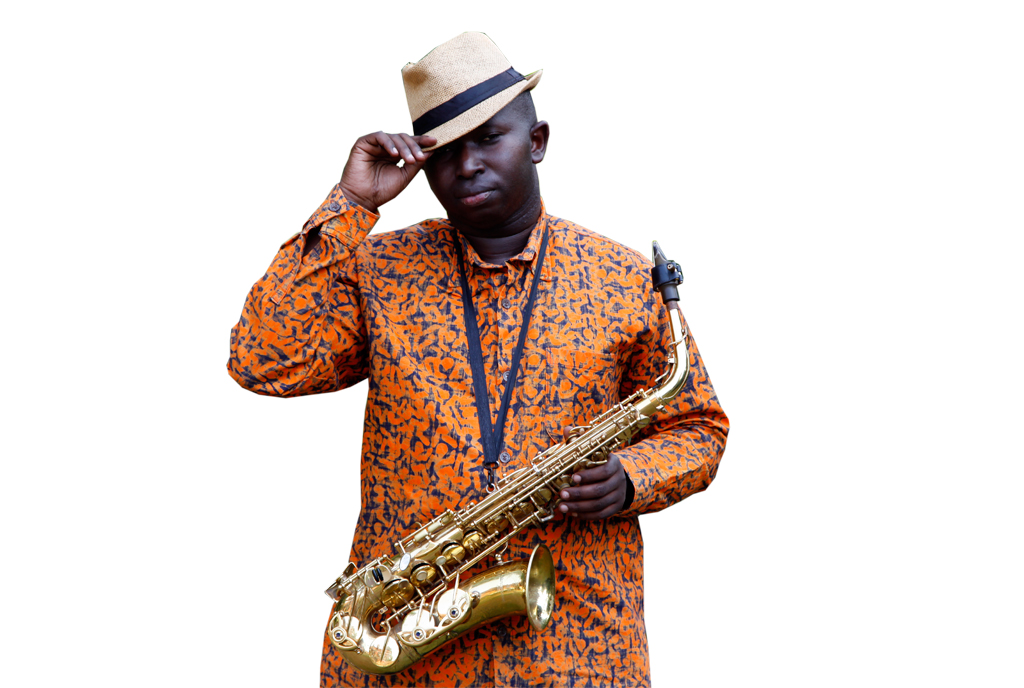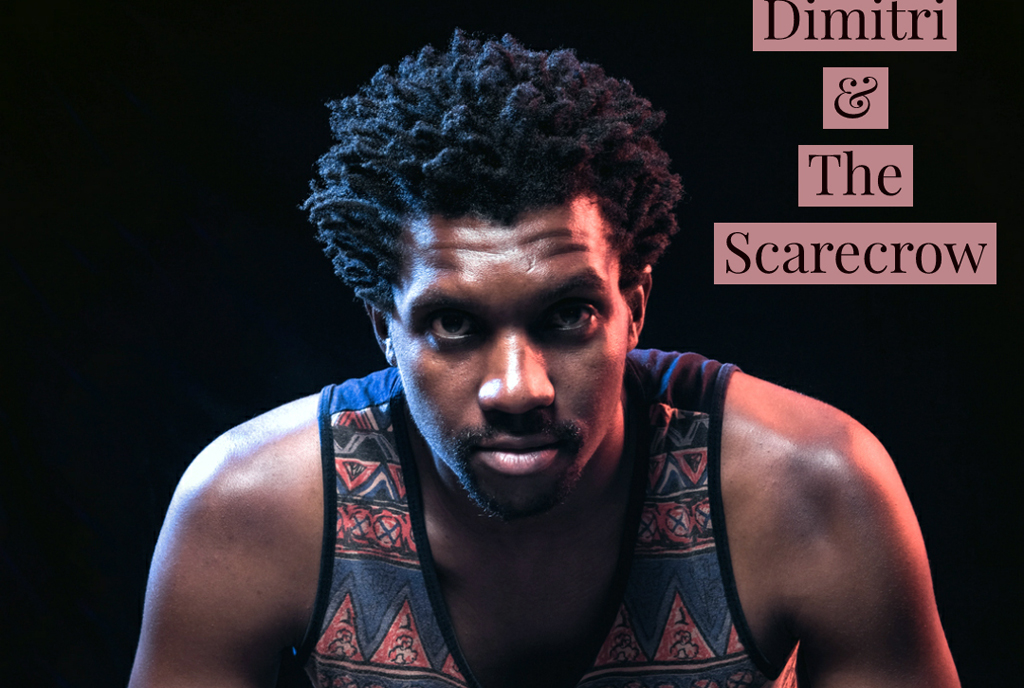
Jazz saxophonist Caesar Kajura. PHOTO/COURTESY
With live concerts and shows still restricted to deter the spread of Covid-19, the musicians are thriving on the Internet as a distribution channel for their music.
Jazz saxophonist Caesar Kajura, and Afro-soul guitarist and crooner Kenneth Mugabi are among the African artistes thriving on the Internet as a distribution channel for their music as the continent continues to absorb the health and economic impact of the Covid-19 pandemic.
With live concerts and shows, the biggest sources of income, still restricted to deter the spread of Covid-19, coupled with the poor collection of royalties in most African countries, some musicians are now relying on web-based music service providers for regular payouts amid the challenges that hinder the penetration of digital technology on the continent.
Among the success stories for the Kampala-based digital music distributor East African Records (EAR) from 2020 is Mugabi, who is one of the company’s best-selling artistes.
EAR managing director David Cecil says through his company’s focused distribution, Mugabi’s music is earning a respectable income from the diaspora and middle-class Ugandans. He released a high-class video of his song Embeera from his 2019 album Ugandan.
“EAR helps me navigate the international market as I get ready to release my third album. I am not yet complaining,” Mugabi says.
Kajura has been making waves worldwide after streaming platform Apple Music playlisted all of his new and old releases, including Aaal Steady and The Girl I Loved, Treadmill off his Treadmill album, and Batembeyi off the Batembeyi album.
Reacting to Apple Music playlisting his music through EAR, Kajura says: “What it means to my music is now people from all over the world can get to hear and streamline it. I am grateful to Apple Music and EAR as well.”
“The other thing that surprised me is my music reaching the US and the UK. My song Aaali Steady on Apple Music introduced me to Ugandans in the diaspora, who invited me to do some shows in the UK and the US. But due to Covid-19, I failed to travel,” Kajura adds.
As to whether he is able to identify the main consumers of his music on Apple Music, Kajura, who plays laidback Afro jazz, says: “I can’t really tell because whenever I get a notification, I see different countries and cities.”
Zimbabwean rapper Dimitri and The Scarecrow, who lives in Uganda, is also thriving on the Internet. He released his debut album Crass Roots Rap with EAR in 2019. He followed this with a series of videos Act of War, Little Raven’s Lullaby, I’ve Got… and Manimal from the album throughout 2020.

Afro-soul guitarist and crooner Kenneth Mugabi performs with Angella Kalule at the unveiling of Mugabi’s Ugandan album in Kampala, 2019. PHOTO/GABRIEL BUULE
These have been well received on television and radio in Uganda, and they have won a number of international awards.
Pyramid Project is a band from Kenya, featuring Sauti Sol’s keyboardist Mutoriah and UK electronic composer Contours. The title track of their Mangroves EP received 100,000 streams on Spotify.
According to EAR, the YouTube Vevo video for Ayaya by Destiny Nsonga performed poorly, but the audio did well on Apple Music, getting placements on New Music Daily, EA Wave and Fresh From Africa playlists. In Uganda, the video and audio played widely on radio and television.
Mad Ice was a big name around 15 years ago, as a Ugandan making a splash on the Bongo Flavour scene in Tanzania. Now living in Finland, he has upped his production style to make a comeback with the beautiful Sina, which was playlisted by Apple Music.
EAR partnered with Germany’s world-leading reggae video site: Reggaeville, which has 1.3 million followers on YouTube. EAR had two video premieres there: Traitor Refix by Blessed San and Hot Till It A Blaze by Justice Osinde.
Blaq Bandana is arguably the most exciting rapper in Uganda at present. His first solo release – Motoka Yange (That’s My Car) – saw him partner with star Kenyan producer Slikback and Tanzania’s Amani Greene, and was playlisted by Apple Music, as well as the prestigious UK Independent Music Podcast.
Bignani Afrika is a local Ugandan dancehall artisted who started to gain attention worldwide after being playlisted by Apple Music and YouTube Music. His most successful release in 2020 is Kill A Man.
However, the executives of the web-based music service providers that we talked to were not willing to divulge the numbers of their subscribers and payouts, perhaps because of the restrictions that come with contractual obligations.
According to Cecil, EAR has two main functions; it is a digital music distributor and manages music studios in Muyenga and Nakasero in Kampala.
“We are not a label, but we work on promotion strategy with artistes whom we distribute music and occasionally provide support for talented but disadvantaged artistes.”
“Our digital distribution business was not directly affected by Covid-19, as we can operate entirely online,” Cecil says. “We distributed a total of 69 releases from March 2020 todate.”
“However, artistes were severely affected in a number of ways,” Cecil observes. “Firstly, an absence of live shows has cut off artistes’ core income stream.”
“Secondly, artistes rely on live shows or appearances to launch their new releases,” Cecil adds. “Some artistes in other countries have used online platforms to perform and launch new releases, but this was not common in Uganda and was not something we embraced. Connectivity issues and costs of data in Uganda make live online shows less attractive.”
“Thirdly, the economic impact of Covid-19 at every level has reduced spending power everywhere, so artistes were less able to invest in securing radio play, promotion, influencers, among others, during the pandemic,” Cecil further adds.
“At best, most artistes were only able to focus on production and pushing their new releases on social media. Nonetheless, some of our releases were quite successful under Covid-19,” Cecil says.
On his part the chief executive officer of Mdundo, a Kenya-based streaming platform, Martin M. Nielsen Mdundo, says: “Mdundo.com was not significantly impacted by Covid-19. My understanding from most of the artistes I have engaged with is that it has massively impacted their earnings from shows, merchandise, endorsements, which for most musicians account for the majority of all income. Therefore, Mdundo has become a more important income stream for many artistes.”
As to how he is managing his music career under the Covid-19 restrictions, Mugabi, says: “I am keeping it on the low, finishing my third album, booking a few gigs here and there to enable me finish my album. I am also collaborating with a few artistes to strengthen my foundation.”
“During this Covid-19, I have been doing some studio work, having jam sessions with different musicians, including those from Brass for Africa. I also relocated to our family farm in Hoima in western Uganda where I have developed other skills besides music, such as coffee farming. When I am booked, I travel to Kampala or anywhere for a performance then head back to the farm,” Kajura says.

Zimbabwean rapper Dimitri. PHOTO/COURTESY
Although a number of musicians have taken to online performances under the Covid-19 restrictions, Mugabi argues that they are not sustainable in Uganda.
“I have done a few online performances and they were safe but virtual performances kill the soul in the music. Live performers feed from audience and vice versa. Virtual performances cannot be sustained in Uganda with poor Internet services.”
In 2019, total revenues for the global recorded music market grew by 8.2 per cent to $20.2 billion, according to the International Federation of the Phonographic Industry (IFPI) 2019 Global Music Report.
The 2019 IFPI report shows that streaming revenue grew by 22.9 per cent to $11.4 billion and for the first time accounted for more than half (56.1 per cent) of global recorded music revenue. Growth in streaming more than offset a -5.3 per cent decline in physical revenue, a slower rate than 2018.
“This growth was driven by a 24.1 per cent increase in paid subscription streaming with nearly all markets reporting growth in this area. There were 341 million users of paid streaming services at the end of 2019 (+33.5 per cent), with paid streaming accounting for 42 per cent of total recorded music revenue,” the IFPI report says.
The work and investment from record companies continued to drive dynamic growth in diverse music markets in 2019; their global networks supporting artistes and their music communities, enabling them to engage with and influence others in exciting ways around the world.
The recorded music industry revenues for Africa and the Middle East grew by 15.9 per cent to $101 million.
As to why streaming or purchasing music online is still low in Africa, Nielsen observes:
“It is important to understand that Africa is an extremely segmented continent. Population groups might not be ready for streaming yet; other groups might have been streaming for years already. From Mdundo’s perspective, the main trend to watch is Internet penetration, there is an expected 600 million Internet users in Africa by 2025, up from less than 300 million in 2018. The customer needs to be online, and have affordable data, for them to stream music.”
According to the International Confederation of Authors and Composers, its African members only collected $88 million in music licensing fees during 2018, less than one per cent of its global total.
Mdundo, which means “rhythm” in Swahili, operates as a mobile-web based music service provider. The company offers songs from African and abroad for free downloads and streaming from website and android applications. Mdundo.com serves consumers and musicians worldwide.
According Cecil, in digital distribution, landing releases on playlists on streaming platforms is key to international success.
“Playlisting guarantees you thousands of streams, which can multiply as you get picked up by other playlists. We mainly target Spotify, Apple Music, Tidal and YouTube Music playlist managers.”
Kajura says music streaming services and online stores are providing alternatives for music distribution.
“Streaming and online stores give people an alternative to physical sales and live gigs. What I can say is someone who is far away is able to get the music online. What I have seen are people nowadays prefer online physical sales when they can hear you live and buy CDs there and then.”
Mugabi concurs: “In this age and era, that is the way to go. If one is shooting for a bigger audience, you have to find more ways that are practical and sustainable. I am planning to sell through my website. How about that?”
Music listening trends in the world
The Music Listening 2019 report, which examines the ways in which music consumers aged 16 – 64 engage with recorded music across 21 countries, shows that music listening has risen.
According to a report by the International Federation of the Phonographic Industry (IFPI), respondents typically spend 18 hours per week listening to music – up from 17.8 hours in 2018. This equates to about 2.6 hours – or the equivalent of listening to 52 three-minute songs – daily.
Most people (54 per cent) identify as ‘loving’ or being ‘fanatical’ about music. Among 16 – 24-year-olds, this rises to 63 per cent.
The report shows that older age groups are increasingly embracing audio streaming services. Engagement with audio streaming globally is strong, with 64 per cent of all respondents accessing a music streaming service in the past month – up by about seven per cent over 2018. The highest rate of growth for engagement is in the 35 – 64-year-old age group, with 54 per cent of that group accessing a music streaming service in the past month (+8 per cent on 2018).

According to the report, copyright infringement remains a challenge for the music ecosystem. At least 27 per cent of all those surveyed used unlicensed methods to listen to or obtain music in the past month, while 23 per cent used illegal stream ripping services – the leading form of music piracy.
The chief executive of IFPI, Frances Moore, says the 2019 report tells an exciting story of how fans are increasingly engaging with music.
“At a time when multiple forms of media vie for fans’ attention, they are not only choosing to spend more of their time listening to – and engaging with music but they are doing so in increasingly diverse ways.”
“The enduring partnership between record companies and artistes is the bedrock on which this growing, exciting global world of passionate music listeners is built. Record companies work with their artistes to help connect them with fans around the world.”
“The report also highlights that the availability of music through unlicensed methods, or copyright infringement, remains a real threat to the music ecosystem. Practices such as stream ripping are still prevalent and return nothing to those who create and invest in music. We continue to coordinate world-wide action to address this,” Moore adds.
The chief executive officer of Mdundo, Martin M. Nielsen, says: “We have seen a massive move from illegal to legal music services globally in the last two decades. In my view, this “move” is primarily as a result of providing good legal solutions to the audience, combined with anti-piracy efforts. We are experiencing the same in Africa, it is still very early but as more legal, and good, alternatives appear combined with stronger anti-piracy efforts we expect to see the same trend in the next 5-10 years in Africa.”
Don’t want to miss out on any story? For updates on all Sqoop stories, follow this link on Telegram: https://t.me/Sqoop





























































